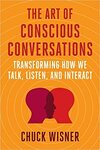

Last month a new book by Manchester’s Chuck Wisner, The Art of Conscious Conversations: Transforming How We Talk, Listen, and Interact was released and it’s received a lot of positive attention from the likes of Fast Company, Psychology Today, and the Harvard Business Review.
The book’s focus—taking murky theories and philosophies on communication and turning them into practical, everyday tools—is a timely topic. Our national political climate is often filled with discord. This week Manchester and Essex held dueling Special Town Meetings that offered heated exchanges and face-to-face votes. And of course, the holidays are here, which can bring unexpected consequences of togetherness.
Wisner is a former partner at a Cambridge architectural firm and has spent the last 25 years as a leadership consultant and advisor to leaders in high-profile companies like Google, Apple, Tesla, General Motors, Shell, among others. Wisner sat down with Erika Brown, editor of The Cricket, to talk about how the dynamic of conversations can be powerful engines of change and growth.
E: Chuck, you are an expert in organizational strategy and something called, “human dynamics and leadership communication.” That sounds complicated.
C: Well, I studied the ontology of language, which is simply about dissecting words and language to understand how we do what we do and why we do it. It's about how language shapes who we are, which can happen in a very lovely way, but it can also happen in a very negative way. The more we understand how language shapes us, the better we can manage ourselves and others.
Very interesting. What made you write this book?
About five years into my career as a leadership consultant, a client of mine who was leaving Chrysler and going to Toyota said to me, “I love all the tools and all the things we've worked on to better myself and my relationship at home and my leadership skills, but I don't know how to connect those dots.” That really stuck with me. And it took a while, but I let it sit for a long time, and thought carefully and one day it dawned on me that I could break general communication into four types of conversations. It was a perfect structure to connect all those dots. With that structure we can understand and better navigate the tools embedded in each. The Art of Conscious Conversations takes a dive into the DNA of conversations.
Let’s get into those four types of conversations. One is “storytelling conversations,” and that seems to be a biggie. Then you have collaborative conversations, creative conversations, and then what you call commitment conversations. And they’re not mutually exclusive, right?
Correct. And they actually have a relationship that is helpful to understand. To start with, storytelling conversations should be very familiar because they are the foundation conversation for all of us, both with ourselves and with each other. Really, storytelling is an introspective look at the stories we tell ourselves, about ourselves, others and the world as it unfolds around us. And they're beautiful things, until they're not.
People don’t understand how fundamental our own stories are. They inspire us but they can also hold us back. Unknowingly, they routinely lead to misunderstandings with others. So, learning how to be aware of your own internal storytelling and investigating those stories is helpful when you’re interacting with others. You can deconstruct the components of this type of conversation with the goal of avoiding emotional triggers.
That understanding is critical when you enter social situations or community situations or work situations. Because, now we have multiple “stories” entering the room, right? And it gets very complex very fast.
You have a lot of good examples in the book. One of them is a personal one about storytelling and you as a young boy, right?
Yes. I grew up with a grandfather who was racist, and a real “man's man” which may be familiar to many people. My three older sisters had their emotions and were allowed to cry but even as a young boy, I wasn’t. If I didn’t want to skin a deer, for instance, because it made me sick or if I didn't want to do something else that my grandfather considered manly, he’d tell me to be a “bigger man,” or, “you’re not a big enough man.” That limiting “story” stuck within me, even more than 20 years later until I busted it. I was actually a six-foot-tall man and a successful partner at an architecture firm in Cambridge. That’s the invisible power of uninvestigated internal storytelling.
There are tools and insights you have about patterns (and breaking them) and approaching conversations with what you call a closed or open fist. And, you write, identifying types of conversations and using these tools can lead to breakthroughs in relationships and productivity.
Exactly. And this is a very, very powerful concept within the collaborative conversation. I love the word patterns because it takes some of the judgment out and enables you to determine if the patterns that come from your storytelling are helpful, or not. It also gives us a degree of flexibility with others. You see how they're acting or reacting in a way that is a little more forgiving, in terms of understanding that maybe they are operating from patterns too. And that makes collaboration easier and more likely.
Let’s take Town Meeting, which just happened in Manchester, as an example. If I'm locked in a “story” about how we should do something and I'm entering that communication or exchange with a clenched or closed fist, then what happens? My mind is closed to new information. My ability to make a good case or to listen is surely limited because I'm there to defend my position. Conversely, if I’ve done a little investigation of our perspective or story, I can unclench my fist, and with an open hand reveal the thinking behind my position. I can be a little more vulnerable and humble and say, “Hey, here are my concerns and my interpretation of what good looks like. Here's what I would like to happen.”
By doing this, I can be more revealing about my own thinking. That's an invitation to others to be more revealing, and that's how we can create collaboration and benefit from real creativity and action.
What do you think about what’s going on in the larger world right now, especially in politics or social media, where people aren’t just disagreeing, but they’re uncivil? There seems to be such discord.
Well, in the book I talk about the fundamental problem we have in some of the politics we see today is the inability to accept reality, or facts. Whether individually or socially, the inability to accept facts begins to sow disbelief and resentment. And then it goes deeper and deeper and we see it play out in various arenas today. We also see it in everyday life. Sometimes non-acceptance of facts and reality can end in actual depression. That happened with my mother who couldn’t accept my father’s death and it was very challenging.
In the book I spend a lot of time illustrating what happens when people are unable to accept the fundamental rules of engagement-- and we all have those whether they’re in the corporate environment, within a marriage, or at Town Hall.
So, the art, if you will, of conscious conversations and the message in your book is that by being aware of how we communicate, we can all have a better outcome.
Yes, awareness and consciousness in conversations drive self-awareness and collaboration. And
the last two – the creativity and commitments conversations – offer their own benefits. The creative conversation expands or thinking, and the commitment conversation insures smarter decisions. Your position might not always be the winner, but ultimately, we all benefit from engaging in conversations more consciously. Everybody wins.
Thanks Chuck. These are great insights for business, Town Meeting, and the Thanksgiving table.
Thank you.
Chuck Wisner’s The Art of Conscious Conversations: Transforming How We Talk, Listen, and Interact is available now. Ask for it at The Book Shop of Beverly Farms or Dogtown Books. Or, if you must, order it on Amazon.